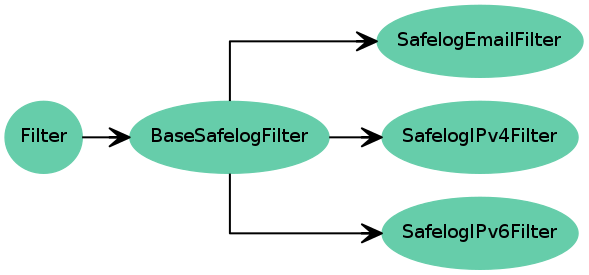bridgedb.safelog¶
Filters for log sanitisation.

The Safelog*Filter classes within this module can be instantiated and
adding to any logging.Handler, in order to transparently filter
substrings within log messages which match the given pattern. Matching
substrings may be optionally additionally validated by implementing the
doubleCheck() method before they are finally replaced
with the replacement string. For example:
>>> import io
>>> import logging
>>> from bridgedb import safelog
>>> handler = logging.StreamHandler(io.BytesIO())
>>> logger = logging.getLogger()
>>> logger.addHandler(handler)
>>> logger.addFilter(safelog.SafelogEmailFilter())
>>> logger.info("Sent response email to: blackhole@torproject.org")
Module Overview:
bridgedb.safelog
|
|_ setSafeLogging - Enable or disable safelogging globally.
|_ logSafely - Utility for manually sanitising a portion of a log message
|
\_ BaseSafelogFilter - Base class for log message sanitisation filters
| |_ doubleCheck - Optional stricter validation on matching substrings
| \_ filter - Determine if some part of a log message should be filtered
|
|_ SafelogEmailFilter - Filter for removing email addresses from logs
|_ SafelogIPv4Filter - Filter for removing IPv4 addresses from logs
|_ SafelogIPv6Filter - Filter for removing IPv6 addresses from logs
-
setSafeLogging(safe)[source]¶ Enable or disable automatic filtering of log messages.
Parameters: safe (bool) – If True, filter email and IP addresses from log messages automagically.
-
logSafely(string)[source]¶ Utility for manually sanitising a portion of a log message.
Parameters: string (str) – If SAFELOGGINGis enabled, sanitise this string by replacing it with"[scrubbed]". Otherwise, return the string unchanged.Return type: str Returns: "[scrubbed]"or the original string.
-
class
BaseSafelogFilter(name='')[source]¶ Bases:
logging.FilterBase class for creating log message sanitisation filters.
A
BaseSafelogFilteruses a compiled regexpatternto match particular items of data in log messages which should be sanitised (ifSAFELOGGINGis enabled inbridgedb.conf).Note
The
patternis used only for string matching purposes, and not for validation. In other words, apatternwhich matches email addresses should simply match something which appears to be an email address, even though that matching string might not technically be a valid email address vis-á-vis RFC 5321.In addition, a
BaseSafelogFilteruses aeasyFind, which is simply a string or character to search for before running checking against the regular expression, to attempt to avoid regexing everything which passes through the logger.Variables: - pattern – A compiled regular expression, whose matches will be
scrubbed from log messages and replaced with
replacement. - easyFind (str) – A simpler string to search for before to match by regex.
- replacement (str) – The string to replace
patternmatches with. (default:"[scrubbed]")
Initialize a filter.
Initialize with the name of the logger which, together with its children, will have its events allowed through the filter. If no name is specified, allow every event.
-
pattern= <_sre.SRE_Pattern object>¶
-
easyFind= 'FILTERME'¶
-
replacement= '[scrubbed]'¶
-
doubleCheck(match)[source]¶ Subclasses should override this function to implement any additional substring filtering to decrease the false positive rate, i.e. any additional filtering or validation which is more costly than checking against the regular expression,
pattern.To use only the
patternmatching infilter(), and not use this method, simply do:return True
Parameters: match (str) – Some portion of the :ivar:`logging.LogRecord.msg` string which has already passed the checks in filter(), for which additional validation/checking is required.Return type: bool Returns: Trueif the additional validation passes (in other words, the match should be filtered), andNoneorFalseotherwise.
-
filter(record)[source]¶ Filter a log record.
The log record is filtered, and thus sanitised by replacing matching substrings with the
replacementstring, if the following checks pass:SAFELOGGINGis currently enabled.- The
record.msgstring containseasyFind. - The
record.msgmatches the regular expression,pattern.
Parameters: record ( logging.LogRecord) – Basically, anything passed tologging.log().
- pattern – A compiled regular expression, whose matches will be
scrubbed from log messages and replaced with
-
class
SafelogEmailFilter(name='')[source]¶ Bases:
bridgedb.safelog.BaseSafelogFilterA log filter which removes email addresses from log messages.
Initialize a filter.
Initialize with the name of the logger which, together with its children, will have its events allowed through the filter. If no name is specified, allow every event.
-
pattern= <_sre.SRE_Pattern object>¶
-
easyFind= '@'¶
-
filter(record)[source]¶ Filter a log record.
The log record is filtered, and thus sanitised by replacing matching substrings with the
replacementstring, if the following checks pass:SAFELOGGINGis currently enabled.- The
record.msgstring containseasyFind. - The
record.msgmatches the regular expression,pattern.
Parameters: record ( logging.LogRecord) – Basically, anything passed tologging.log().
-
-
class
SafelogIPv4Filter(name='')[source]¶ Bases:
bridgedb.safelog.BaseSafelogFilterA log filter which removes IPv4 addresses from log messages.
Initialize a filter.
Initialize with the name of the logger which, together with its children, will have its events allowed through the filter. If no name is specified, allow every event.
-
pattern= <_sre.SRE_Pattern object>¶
-
easyFind= '.'¶
-
filter(record)[source]¶ Filter a log record.
The log record is filtered, and thus sanitised by replacing matching substrings with the
replacementstring, if the following checks pass:SAFELOGGINGis currently enabled.- The
record.msgstring containseasyFind. - The
record.msgmatches the regular expression,pattern.
Parameters: record ( logging.LogRecord) – Basically, anything passed tologging.log().
-
-
class
SafelogIPv6Filter(name='')[source]¶ Bases:
bridgedb.safelog.BaseSafelogFilterA log filter which removes IPv6 addresses from log messages.
Initialize a filter.
Initialize with the name of the logger which, together with its children, will have its events allowed through the filter. If no name is specified, allow every event.
-
pattern= <_sre.SRE_Pattern object>¶
-
easyFind= ':'¶
-
filter(record)[source]¶ Filter a log record.
The log record is filtered, and thus sanitised by replacing matching substrings with the
replacementstring, if the following checks pass:SAFELOGGINGis currently enabled.- The
record.msgstring containseasyFind. - The
record.msgmatches the regular expression,pattern.
Parameters: record ( logging.LogRecord) – Basically, anything passed tologging.log().
-